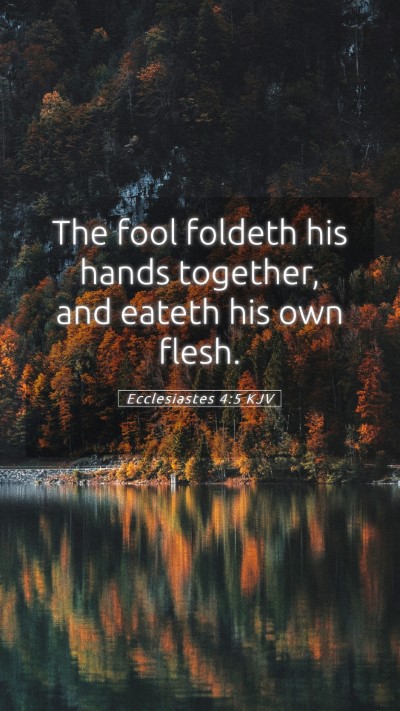Old Testament
Genesis Exodus Leviticus Numbers Deuteronomy Joshua Judges Ruth 1 Samuel 2 Samuel 1 Kings 2 Kings 1 Chronicles 2 Chronicles Ezra Nehemiah Esther Job Psalms Proverbs Ecclesiastes Song of Solomon Isaiah Jeremiah Lamentations Ezekiel Daniel Hosea Joel Amos Obadiah Jonah Micah Nahum Habakkuk Zephaniah Haggai Zechariah MalachiEcclesiastes 4:5 Meaning
What is the meaning of Ecclesiastes 4:5?
The fool foldeth his hands together, and eateth his own flesh.
Ecclesiastes 4:5 Bible Verse Meaning
Ecclesiastes 4:5: "The fool foldeth his hands together, and eateth his own flesh."
This profound verse invites a deeper understanding of human behavior and wisdom as we navigate through life. The imagery used in this scripture strikes a majestic reflection on the consequences of apathy and laziness compared to industriousness and diligence.
Meaning of Ecclesiastes 4:5
Ecclesiastes 4:5 provides a stark contrast between two approaches to life: the diligent worker versus the idle man. The verse succinctly asserts that the fool, who is characterized by lethargy and passivity, ultimately harms himself — akin to consuming his own flesh.
Bible Verse Explanations
- Matthew Henry's Commentary: Matthew Henry interprets this verse as a warning against the dangers of slothfulness. He emphasizes that inaction leads a person to self-destruction, indicating that the idle person may indulge in self-destructive behavior by not engaging in purposeful activities.
- Albert Barnes' Commentary: Albert Barnes expands on the idea that the "fool" refers not merely to a person lacking intelligence but someone who chooses to ignore wisdom and understanding. He highlights the consequences of idleness, equating it to a form of cannibalism, where one’s own neglect can lead to ruin.
- Adam Clarke's Commentary: Adam Clarke adds that this verse can be seen as an indictment of those who are complacent or indifferent to their responsibilities. He points out that such behavior leads to a lack of sustenance and ultimately self-harm, catering to the idea that human beings must be active participants in their lives.
Biblical Exegesis
Diving deeper into the scriptural context, Ecclesiastes acts as a reflective text on the human condition, capturing the essence of existential doubts and life's futility. The proverb highlights that those who refuse to work and engage meaningfully with the world are not only losing out but are also indulging in self-destructive behaviors that lead to metaphorical self-cannibalization.
Understanding Scripture
Incorporating this verse into Bible study insights provides vital lessons for contemporary life. It serves as a stark reminder to avoid laziness, advocating for diligence and proactivity as vital virtues. This passage encourages readers to engage actively with their talents and opportunities given by God to enrich their lives and the lives of others.
Bible Study Insights
For those involved in bible study groups or engaging in online bible study, focusing on Ecclesiastes 4:5 allows for rich discussions around the implications of laziness versus diligence, fostering a culture of responsibility and commitment within the community.
Application of Ecclesiastes 4:5
The practical application emerges in emphasizing that every individual has a choice to either engage in fruitful works or waste opportunities. Contemplating this verse can inspire believers to reflect on their daily actions, prompting positive changes toward productivity and conscientious living.
Cross References
- Proverbs 6:6-8: Encourages observing the ant, which works diligently without a ruler.
- Proverbs 10:4: States that diligent hands bring wealth, reinforcing the necessity of hard work.
- 2 Thessalonians 3:10: Asserts that one must work to eat, highlighting the value of labor.
Conclusion
In conclusion, Ecclesiastes 4:5 provides a powerful commentary on the consequences of foolishness associated with inaction. Through a collaborative analysis from esteemed public domain commentators, we gain a thorough understanding of this verse's significance, encouraging readers to embrace active engagement in their lives. As such, we hope this exposition aids in your quest for bible verse meanings, bible verse interpretations, and further understanding of Scripture.


